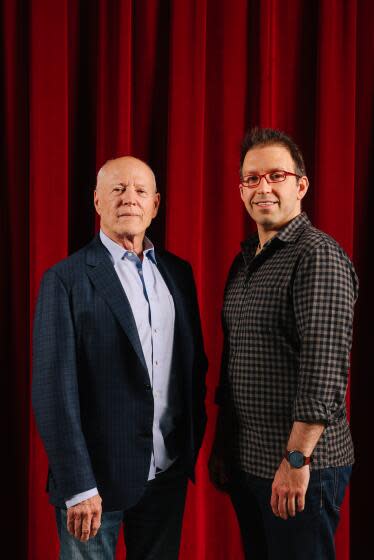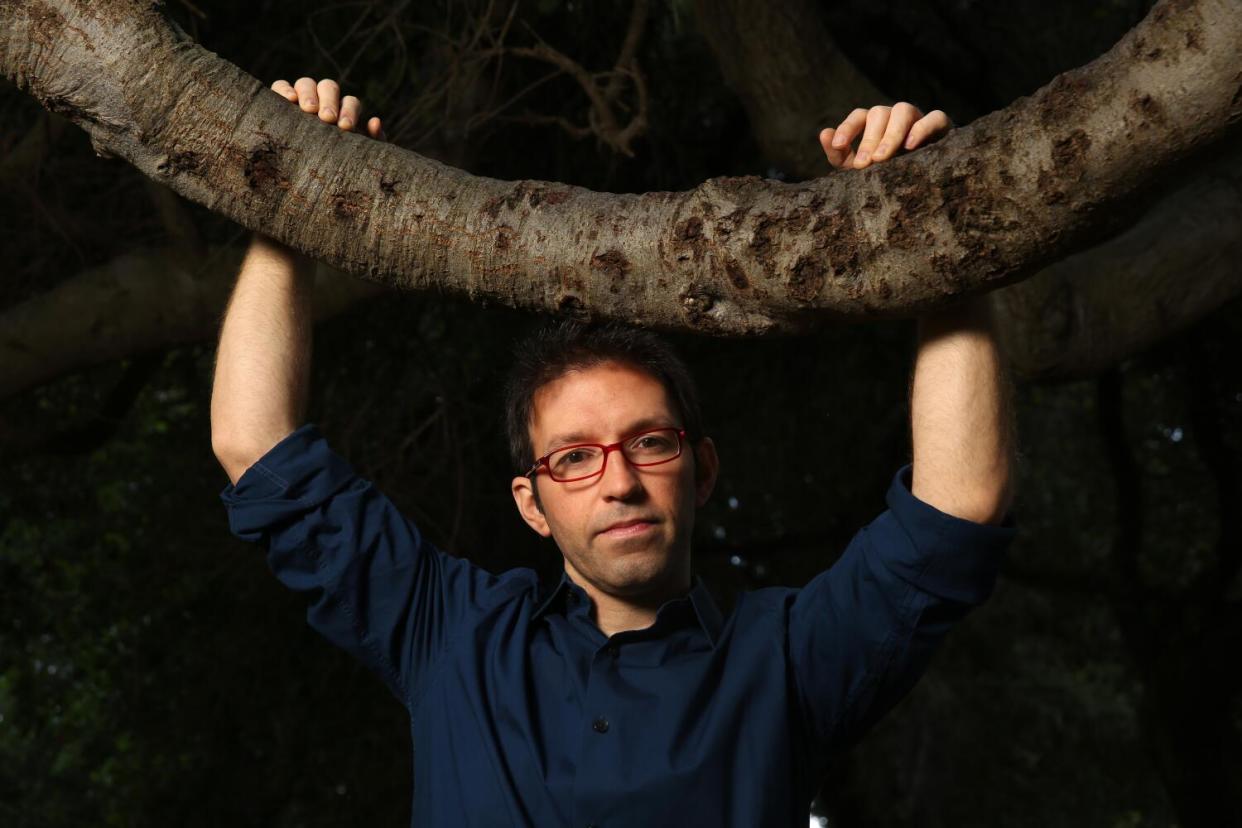Need a little hope? Geffen Playhouse magic show proves hope is more than an illusion

Did the shattering year of 2020 actually happen? Did the country really shut down that eerie, silent spring? Did we stop going to plays, movies, concerts and more?
The COVID-19 pandemic feels like a fever dream, which may be why it feels so significant that the creators behind one of the pandemic's earliest theater success stories are re-emerging — live and in person — for a world premiere at Geffen Playhouse, opening Thursday.
The show is "The Hope Theory," the star is sleight-of-hand magician Helder Guimarães, and the director is Frank Marshall, the legendary producer of the "Indiana Jones" and "Jurassic Park" franchises. The story of how these two artists came together to crack the code to pandemic-era theater and reunited to stage this celebratory return to the Geffen stage before a packed house of living, breathing-all-over-one-another human beings is filled with delightful synchronicity, tenacious dreaming and some Space Age Nike shoes based on "Back to the Future" sneakers.
But first, a primer on the Guimarães show that changed the course of the pandemic for Geffen Playhouse. It was called "The Present," and members of the audience attended via Zoom, bringing with them mystery boxes mailed by the theater filled with items that helped them to participate in the magic. Guimarães performed from his Glendale apartment, where his then-fiancée (now wife) worked the camera. Marshall directed remotely from his Malibu home.

The show opened May 7, 2020, and was extended multiple times before wrapping up in October, at which point it had accumulated rave reviews, sold out 251 shows and grossed more than $700,000. Guimarães performed up to 13 times per week. The grand finale, which had no cap on the number of people on the Zoom, drew more than 6,000 households.
During an interview at the Geffen this month, Guimarães and Marshall shook their heads, smiling and clearly still a bit unbelieving about the box-office magic that had unfolded among them, the theater and the audience four long years ago.
"It was just an interesting process. Since everything else stopped and everyone was at home, time kind of expanded," Guimarães said. "So in a lot shorter amount of time, we could do a lot more work."
Marshall recalled leaving his family in the living room, pouring a glass of wine and stepping into another room of his house to get to work. There were funny moments when he forgot to mute himself in Guimarães' ear during performances and times when he spent the show just watching families and friends react in Zoom boxes to Guimarães' jaw-dropping feats. He recalled a couple of tipsy ladies watching from a hot tub, and another viewer who took in the evening's performance from the bathtub.
"It was just so much fun. But also the word that describes the whole thing was 'hope,'" Marshall said. Hope that the world would keep moving, that entertainment was still possible, that families could come together and forget for a few delicious hours just how difficult the world outside had become.
Read more:L.A.'s Mark Taper Forum will reopen, but does Center Theatre Group have a sustainable path forward?
Fast-forward four years, and hope is once again a word in play as the team mounts its new show, which recounts the Portuguese-born Guimarães' experience immigrating to the U.S. at age 29. As with all of Guimarães' shows, the careful narrative unfolds through his magic.
"That's what we go to the theater for, to engage mystery," said the Geffen's new artistic director, Tarell Alvin McCraney, the playwright and "Moonlight" screenwriter. "To see something we couldn't see sitting on a couch or in an intimate way."
McCraney is also excited that Guimarães is presenting three shows in Spanish, engaging an important, often-neglected part of L.A.'s theater-going community.
The Geffen has long been an incubator and supporter of Guimarães' magical spectacles, beginning with a 2019 show called "Invisible Tango."
Read more:The Broad announces massive expansion that will increase gallery space by 70%
That show marked the start of Guimarães' collaboration with Marshall — and here's where the synchronicity, tenacious dreaming and "Back to the Future" shoes come into play. Marshall co-founded Amblin Entertainment alongside his wife, Kathleen Kennedy, and Steven Spielberg, and he has five Academy Award nominations for best picture. So how did he end up directing relatively intimate stage shows?
Magic.
Marshall, it turns out, is an amateur magician, having performed under the name Dr. Fantasy and pulling magic out of a trunk for a then-9-year-old Tatum O'Neal in the early ’70s on the Kansas set of the movie "Paper Moon." Marshall performed a bit of magic during wrap shows for all his subsequent films, ending with "Alive" in 1993.
"And then Dr. Fantasy retired," Marshall said with a laugh. But he never stopped loving magic, and in 2019, when Guimarães was looking for a director for the show that would become "Invisible Tango," Marshall was increasingly interested in live theater and the ways directing for the stage differed from directing for the screen. So when a mutual friend — who was a member of the Magic Castle in Hollywood as well as of the Academy of Motion Picture Arts and Sciences — floated the idea of working with Guimarães, Marshall was primed to be interested.
Guimarães figured Marshall had agreed to a meeting as a courtesy but would be unlikely to sign onto the project. Still, Guimarães couldn't contain his excitement when he stepped in the door of Marshall's office and saw the replicas of the "Back to the Future" sneakers in a glass case.
"I freaked out. Because I am a huge fan of 'Back to the Future,'" Guimarães said. "I saw 'Back to the Future' more times than all the other movies combined in my life. And so I'm like, 'I'm definitely not prepared for this meeting.'"
The meeting was scheduled for 30 minutes. At the end, Marshall said, "Let's do this." It was not the answer Guimarães was expecting, but it ended up being the beginning of a collaboration that helped the Geffen survive the pandemic — and sow the seeds of hope that the theater industry at large could innovate and survive in even the most difficult of times.
In 2020, that was magic enough.
This story originally appeared in Los Angeles Times.
